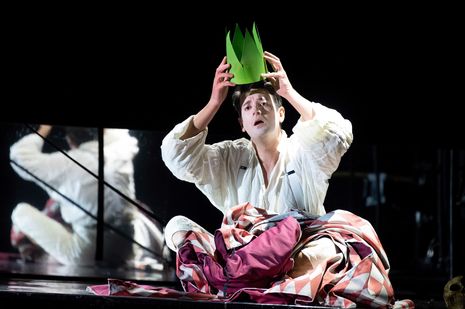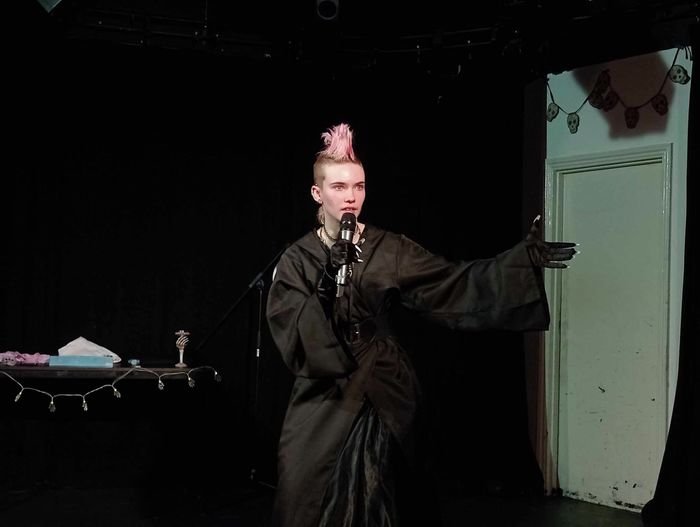Manon Lescaut makes a splash
Jude Christian’s adaptation leaves its audience lost at sea (and that’s exactly what she wants)

Sometimes you come away from the theatre and discover the most compelling character is someone who never took the stage. Come the English Touring Opera’s Manon Lescaut last night, I found my focus snatched not by Jenny Stafford’s equally frivolous and plaintive Manon nor the earnestness with which Gareth Dafydd Morris plays Des Grieux, but director Jude Christian. Admittedly, I was anticipating this: last March, I caught Christian’s Titus Andronicus at the Sam Wanamaker Theatre in London, and to this day it weirds me out. Why was everyone in matching pyjama-ish garb and braids? Why wasn’t a single drop of blood spilled, but an entire candelabra blended like a smoothie? When the register of Titus is violence against women, can you stage such a play without a single man on the stage? Why was everyone singing a song about cannibal rabbits? Basically, I want to pick Christian’s brains (and beg her to sit my final tragedy exam for me).
“Manon Lescaut might be a ‘surreal nightmare,’ but Christian’s version ends up a daydream”
All of this is to say that Christian is no stranger to sharpening female suffering via surrealism, and boy does that explode in every technicolour direction in Manon Lescaut. It’s like someone took the CBeebies 2004 TV show Rubbadubbers, smooshed it into a circus inviting enough to put paid to the Pied Piper, added enough bright silks and boas to make Elton John jealous, and employed an ensemble with talent as eye-catching as Geronte’s rather darling pink hat.
You should always read the libretto before attending an opera, but this adaptation in particular benefits from knowing exactly where Manon is headed. Puccini’s playful overture underscores a woman’s gleeful dousing with a gallon of water, the preening ensemble parades paper cups from a water cooler as if they were fans or purses, and the entirety of the first two acts are set in a swimming pool. Water is in abundance – that is, until Manon dies of thirst.
“It’s bright and bold and the perfect illustration of why opera’s really better seen and heard”
I have a soft spot for Des Grieux, so the choice to deck him out in all white among the garish block colours of the ensemble appeals to me. Morris’ turn as the romantic hero matched his costuming; in a world of camp, he was the only character you could pluck out and put in another Puccini without redirection. He’s the perfect counterpoint to Edward Hawkins’ villainous Geronte, who put me in mind of Nathan Lane in The Birdcage with a million times the malevolency. It says a lot about this production that Des Grieux arrived on a eight foot dolphin float and I’m dubbing him understated. I’ve still to decide how I feel about his shouted, not sung, “Manon!” as his love is led away, but the decision to keep him as the quintessential romantic in an uncanny bath-time dream narrative is undeniably intriguing.
“It says a lot about this production that Des Grieux arrived on a eight foot dolphin float and I’m dubbing him understated”
There are some design choices that do more to compromise than tweeze out tragedy. Manon’s blue hair and pale outfit renders her the reverse of the ensemble, the quintessential fish out of water, but she’s occasionally more Thing 2 than ingénue. Don’t get me started on the orange wash in Manon’s final heartrending moments… which turned the blue wig green, Stafford’s face orange, and my mind to a certain Chocolate Factory. Looks like Manon is Oompa Loompa doompety-doomed.
Manon Lescaut might be a “surreal nightmare,” but Christian’s version ends up a daydream. When the opera’s (much shorter) second half opened on a snoozing blue-haired office worker, prodded by the impish Edmondo (Brenton Spiteri), my exact thought was ooooh. It’s the kind of directorial decision that makes you lunge for the libretto, feverishly muttering I swear Puccini didn’t have hydroflasks. But when the blue-haired dreamer woke, everything she might represent slipped away. Figuring out Christian’s intentions here felt like trying to hold onto a dream once you’ve woken up: it’s impossible, redundant, and you should probably get on with your day.
As this blue-haired dreamer wandered Manon’s trial and exile, I couldn’t help but feel that more could have been done with her. Does she represent a waking world’s Manon in their shared hair colour? Is she a part of this strange swimming pool Puccini or is she a trespasser? There’s a single moment among Manon’s final overtures, sweet in its simplicity, in which Manon at last catches sight of the dreamer. The two stare at each other, caught. And then the moment slips away, just as we’re beginning to get somewhere. I’m not saying I don’t appreciate the attempt, but I could have done with more decisive dreaming.
Christian sees Manon Lescaut as a collection of “the most depressing experiences of contemporary womanhood” (no wonder this production is nightmarish). It’s bright and bold and the perfect illustration of why opera’s really better seen and heard. It’ll certainly keep me up at night for the next week – perhaps more out of puzzlement than anything else.
 News / Report suggests Cambridge the hardest place to get a first in the country23 January 2026
News / Report suggests Cambridge the hardest place to get a first in the country23 January 2026 Comment / Cambridge has already become complacent on class23 January 2026
Comment / Cambridge has already become complacent on class23 January 2026 News / Students condemn ‘insidious’ Israel trip23 January 2026
News / Students condemn ‘insidious’ Israel trip23 January 2026 Comment / Gardies and Harvey’s are not the first, and they won’t be the last23 January 2026
Comment / Gardies and Harvey’s are not the first, and they won’t be the last23 January 2026 News / Cambridge ranks in the top ten for every subject area in 202623 January 2026
News / Cambridge ranks in the top ten for every subject area in 202623 January 2026










